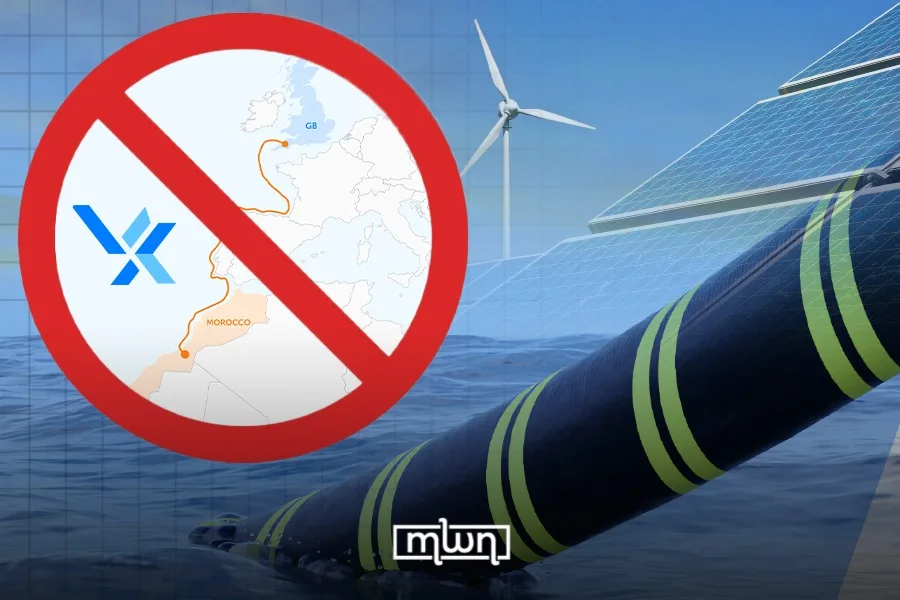Marrakech – The British government has decided to reject the major renewable energy project that would have imported solar and wind power from Morocco to the United Kingdom.
According to Sky News, Energy Security and Net Zero Secretary Ed Miliband has chosen not to proceed with formal negotiations with Xlinks, a privately owned company seeking a 25-year price guarantee agreement.
The £25 billion project, chaired by former Tesco chief executive Sir Dave Lewis, promised to deliver enough renewable energy to meet nearly 10% of the UK’s electricity demand.
The decision comes as a surprise to energy industry executives, as Xlinks had pledged to provide large quantities of power at approximately half the price of electricity generated by new nuclear power stations.
A Whitehall insider indicated that the government’s decision was partly motivated by a desire to focus on “homegrown” energy supplies.
This position was reinforced when Miliband stressed the government’s “pragmatic determination” to free itself from fossil fuel market fluctuations through local, clean, and less expensive energy that the country can control.
Xlinks had been seeking to agree a 25-year contract for difference with the Department for Energy Security and Net Zero, which would have guaranteed a price for the power generated by the project.
The company was looking to secure its business model through this mechanism, also known as a “compensatory gap contract,” particularly for financiers and funders.
The project involved the construction of a 4,000-kilometer cable between Morocco and the Devon coast. It aimed to provide 3.6 gigawatts of clean, on-demand energy from solar, wind, and battery installations in Morocco to the UK, reducing the UK’s carbon emissions by 10% and lowering wholesale electricity prices by 9.3%.
Market-testing for the project’s financing had been significantly oversubscribed, according to sources, with investors including Total, the French energy giant. The company had raised about £100 million in development funding so far.
In an interview with Sky News in 2022, Sir Dave said Xlinks enjoyed low geopolitical risk because of Britain’s centuries-old trading relationship with Morocco and the north African country’s ambitions of growing the energy sector as a share of its exports.
“The Moroccan government has recognized that exporting green [energy] is a very important part of their economic plan going forward, so they have an export strategy,” he said at the time.
“The Sahara desert is probably one of the best places in the world to generate renewable energy from… so you have a very long period of generation. And if you’re capturing that energy and adding some battery storage, you can generate energy to cover a little bit more than 20 hours a day, which makes it a fantastic partner for the UK.”
Sir Dave had also noted that modern high-voltage cables meant energy could be transported “over very long distances with very, very few losses.” He explained that the technology risks were relatively small, citing examples of much longer cable links being planned elsewhere in the world.
“The benefit here is that it’s proven technology with a very committed reliable partner with a cost profile… that we will never [be able to] match in the UK,” he added.
Earlier this year, Sir Dave told The Sunday Telegraph that Xlinks would switch its focus to another country if the UK government did not agree to support the project. The company is now expected to explore other commercial opportunities.
In late May, Xlinks requested a pause in the procedure to obtain the Development Consent Order (DCO) while awaiting a response from the British department of energy security and net zero regarding the Contract for Difference.
In its letter, Xlinks cited “exceptional circumstances beyond control” and believed that a pause “would allow the review process to proceed in the most efficient and rigorous manner possible, while ensuring that the DCO could then progress quickly.”
It is worth noting that the Morocco-UK project was integrated into the UK’s strategic energy vision in 2022 and recognized as a project of national importance in 2023. A ministerial statement confirming the decision to reject the project is expected later today.
